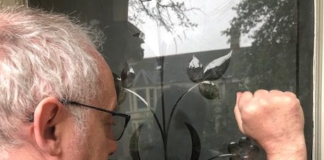- Difficult access - 9th July 2025
- Police display - 9th July 2025
- Crime and punishment - 8th July 2025
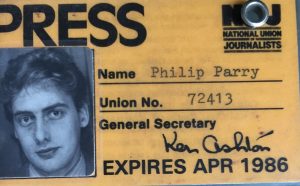
On The Eye our Editor Phil Parry has described how he was helped to break into the South Wales Echo office car when he was a cub reporter, recalled his early career as a journalist, the importance of experience in the job, and making clear that the ‘calls’ to emergency services as well as court cases are central to any media operation.
He has also explored how poorly paid most journalism is when trainee reporters had to live in squalid flats, the vital role of expenses, and about one of his most important stories on the now-scrapped 53 year-old BBC Cymru Wales TV Current Affairs series, Week In Week Out (WIWO), which won an award even after it was axed, long after his career really took off.

Phil has explained too how crucial it is actually to speak to people, the virtue of speed as well as accuracy, why knowledge of ‘history’ is vital, how certain material was removed from TV Current Affairs programmes when secret cameras had to be used, and some of those he has interviewed.
After disclosing why investigative journalism is needed now more than ever although others have different opinions, and how information from trusted sources is crucial at this time of crisis, here he looks at the fact that the law has always played a central part in his career.

A journalist always has a lot to do with lawyers.
During many years in journalism I have dealt with them a lot, and I was interested to see that a new book has just been released by one of the most celebrated in the profession.
From Crime to Crime: Harold Shipman to Operation Midland — 17 Cases That Shocked the World is by the barrister and judge Richard Henriques and has been published by Hodder at £25, with an ebook edition for £24.99. In it he outlines many of the most notorious cases he has been involved with.
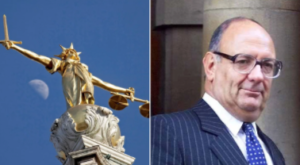
He is devastating in his criticisms of conspiracy theorists, and I too believe they have a lot to answer for (see story soon). In the book, Mr Henriques gives some of the most scathing commentary I have read for the grotesque folly of Operation Midland, which meant that Field Marshal Lord Bramall, a D-Day veteran he describes as “the most distinguished living Englishman”, was interrogated for hours on the dubious word of a malevolent fantasist called Carl Beech.
It is a disgrace, he thinks, that there has never been a proper investigation into the role of senior officers, such as the former Metropolitan Police Deputy Assistant Commissioner Steve Rodhouse, who runs the National Crime Agency. As Mr Henriques rightly remarks: “Those named by Carl Beech and their families and the public deserve better”.
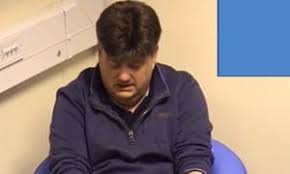
As an investigative journalist monitoring what we do on The Eye, legal opinions like his are central to our stories.
We expose fraudsters, criminals (like Beech) as well as lying politicians, bent police officers and crooked business people, but these sorts of pieces are not easy and often sail very close to the wind legally. Our journalists need a thorough knowledge of libel laws, and most articles are then referred to a lawyer to be double-checked so that we don’t end up in court! Every journalist worth his or her salt must know the laws of libel.
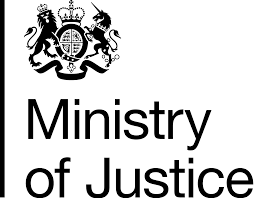

Broadly speaking, being obnoxious does not defame someone, but undermining the reputation of that person, or the ability to earn a living, may do.
This is the bedrock of journalism, and luckily knowing this has earned me many awards.
You can say, for example, that the First Minister of Wales (FMW), Mark Drakeford, is a bastard (although he is not) because that could be defended as Fair Comment (or Honest Comment as it is now known), but you cannot say he is a cheating bastard unless you have very strong evidence (but there is none, because he is NOT a cheat – let me make that perfectly clear!).
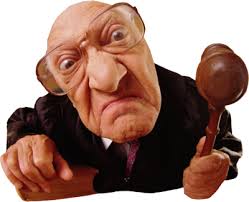
Over the years I have been involved in countless legal cases – covering them, defending them and prosecuting them.
The regular Tuesday evening BBC Wales Television Current Affairs series I presented for 10 years from 1989, Week In, Week Out, has been axed after 53 years, and replaced by ‘BBC Wales Investigates’ for occasional ‘big’ stories, but on Mondays we would invariably be joined by a corporation lawyer to check every word of the programme script, as well as every frame of the film.
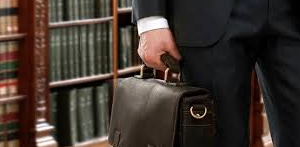
People who had no idea of the law would complain about things that were NEVER in the programme!
After libel cases I have won large amounts of money, and lost large amounts of money for my then-employer when the court has not accepted my lawyer’s defence. The media landscape, and indeed the law itself, changes all the time; but the fundamentals do not. Newspaper circulations may be plunging but legal basics are unchanged.
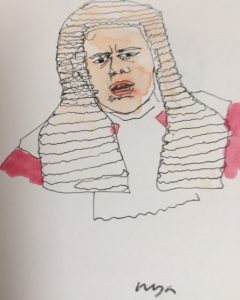
A piece published on Facebook or Twitter is governed by the same laws of libel as if it were an item on BBC Wales Today or a page-lead in the Western Mail. People do not seem to be aware of this though, and they say the most appalling things on social media, and some of it is libellous.
A widespread dissemination comes into it too.
I have been called, wrongly, a “lying bastard” and “biased” as well as “misogynistic” on the internet. The full text of the ‘biased’ tweet came after a story about a woman Senedd/Welsh Parliament MS member, and was: “Severed links with @WalesEye (our Twitter name) years ago. Unfunny, biased, personal, superficial, mysoginistic (sic), out of touch &bitter. That’s WalesEye, not me”.
Now, you can probably get away with most of this stuff although it is obnoxious (‘unfunny’ for example can be defended as Honest Comment) but ‘biased’ and ‘misogynistic’ (even if misspelt) are quite different. Possessing the knowledge of what separates these things is crucial.
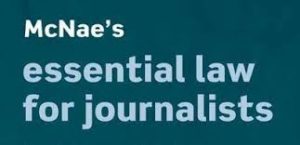
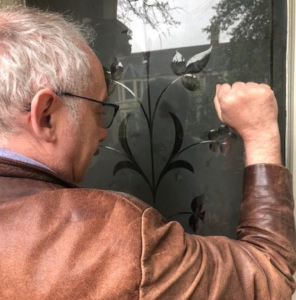
To call a journalist ‘biased’ (let alone a ‘misogynist’) is probably the worst thing you can say, because it undermines that person’s ability to earn a living. If you are seen as not being neutral, then people will refuse to come to you with the other side of the story. Also, this was by someone who has a fairly large following on Twitter.
As to the first ‘bastard’ comment – that is probably acceptable (I hold my hands up to being a bastard on the doorstep sometimes!) but a ‘liar’ is something you should never say about a journalist unless, again, you have very strong evidence.

On the other hand, this blog was seen by virtually no one, and the dissemination would not have been widespread – so I did nothing about it.
The second insult on Twitter was another matter entirely. I went straight to my libel lawyer who consulted a specialist barrister. We threatened to sue and a full apology as well as retraction were duly published.
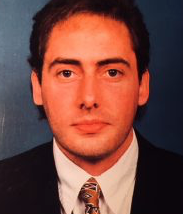
But knowing about these rules seems to be a scarce commodity, and over the years on The Eye we have endured numerous threats of legal action from people who do not understand what they are saying.
None of these threats have come to anything.
A major player in the Welsh media world is Media Wales which has the newspaper Western Mail in its stable and the website WalesOnline.
After an accurate satirical piece that we wrote on The Eye about the number of items in WalesOnline on the Cardiff bar ‘Coyote Ugly’, the Editor of WalesOnline Paul Rowland, threatened to sue me, saying “I am placing it (the satirical piece) in the hands of our lawyers” adding the extraordinary words “satire is no defence against libel”.
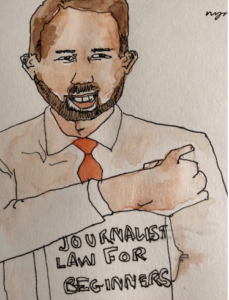
In fact, satire CAN be a defence against libel if it is wrong – you can say, ‘yes it was inaccurate but it was meant to be funny’. In this case, though, it was accurate as well, so there were TWO defences! It infuriated me that ostensibly one of the most important journalists in Wales, plainly, on this evidence, knew NOTHING about the law of libel!
Mr Rowland also has an intriguing view of what constitutes journalism.
He advised a reader anxious to break into journalism to write lists about the best places to eat in Wales, but strongly denied this was ‘clickbait’.
He wrote on WalesOnline: “You might not be interested in ’19 mouth watering street food dishes and where to find them in Wales, and you might believe it’s not something we should be writing (I wouldn’t agree, but that’s fine). That doesn’t mean it’s clickbait.”

But real journalism is much harder than just writing about ’19 mouth-watering street food dishes’. In pursuing it you also need to be aware that identity is another key fundamental in libel law.
We exposed a convicted fraudster called Steve Chan, who worked at the Swansea University School of Management, but it took many months of checking to do so. One Chan had been jailed for more than four years by a court in Boston after a massive fraud, while another was an academic at Swansea. We needed to establish that the two people were in fact the same, and unfortunately pictures of Chan did not help as he had lost a lot of weight.

In the end we were helped by The Boston Globe’s investigation team Spotlight, and sources inside Swansea University (SU). We showed how the convicted fraudster and ‘academic’ WERE Chan, and that he moved on to advise another company with an interesting history.
These sorts of stories are trickier than just writing lists about food, but although the law alters, the basics are always the same.
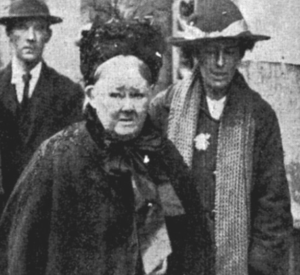
In 1921 an interesting court case took place after a strange incident in Littlehampton. A woman called Edith Swan had been sending poison pen letters to neighbours she hated. Here is an extract of one of them: “You bloody fucking piss country whores go and fuck your cunt. It’s your drain that stinks not your fish box. Yo fucking dirty sods. You are as bad as your whore neybor.”
But the jury in the libel trial of Swan refused to convict her because she had an education (unbelievably) after a judge’s direction, and another jury later wrongly convicted an ill-educated woman called Rose Gooding, who was sentenced to 12 months in prison with hard labour. She was fully exonerated afterwards.
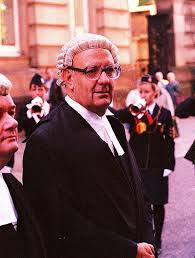
My point is that the legal aspect may change (and sometimes the law is an ass!) but the fundamentals do not.
Mr Henriques knows only too well those legal fundamentals.
His point is particularly important that there should be an inquiry into why so many people believed the liar Beech. Why, Mr Henriques asks, were the police so quick to believe Beech, whose lurid stories (including about children being murdered) never came close to adding up?
I second that.
The memories of Phil’s extraordinary 36-year award-winning career in journalism when knowing the law has been so important and as he was gripped by the incurable neurological condition Hereditary Spastic Paraplegia (HSP), have been released in a major book ‘A GOOD STORY’. Order the book now!
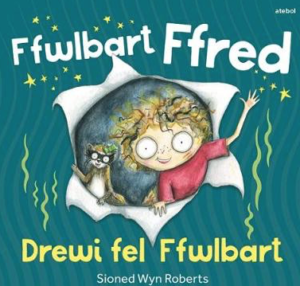
If you need something to keep the children entertained during these uncertain times (in Welsh) try Ffwlbart Ffred about the amusing stories of Ffred and his pet.









